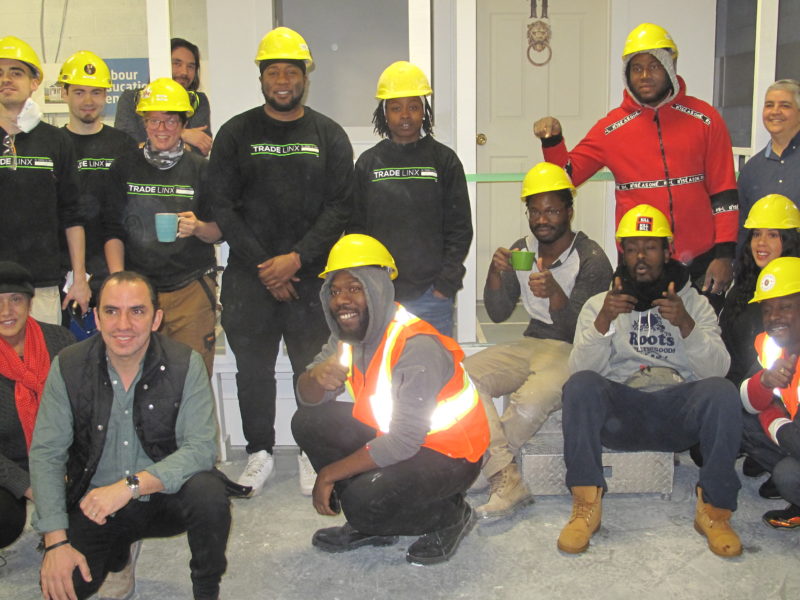Project Insights Report
From Policy to Action: Building Infrastructure for Social and Economic Impact
Self-Attestation: Removing Barriers to Diversity in Supply Chains
 Executive Summary
Executive Summary
AnchorTO, established by the City of Toronto in 2015, formed a network with 18 public sector institutions to embed community wealth-building practices into their work, primarily within their procurement strategies. The Future Skills Centre (FSC) funding supported AnchorTO to transition its role to that of an intermediary that supports suppliers and other anchor institutions to harmonize procurement strategies relative to diverse suppliers. For this project, anchor institutions are defined as place-based, mission-driven organizations, such as cultural institutions, universities and colleges, nonprofits and local government agencies, that often play an essential role in promoting economy stability, creating jobs and facilitating partnerships with local businesses.
From 2021 to 2023, AnchorTO’s focus was on researching and engaging with businesses and public sector entities, crafting user resources for the public sector, developing a business hub prototype, and providing procurement training through a dedicated resource hub.
This project experienced significant challenges. Procurement is already a complex process within each individual institution, making it even more difficult to coordinate efforts across the cohort. Core challenges were due to differing levels of maturity in social procurement practices among anchor institutes, lack of consensus on the definition of a “diverse supplier” among these institutes, difficulties ensuring content delivered strong value for all participants, as well as a need to reset relationships to strengthen mutual respect and collaboration among partners to make the achievement of project goals possible.
Key Insights
Varying levels of maturity in social procurement, practices and capacities across anchor institutes made it difficult to work together and coordinate sustained efforts.
The definition of a “diverse supplier” was not consistent across anchor institutes.
Successful collaboration and communities of practice require constructive dialogue to ensure all members feel respected. To sustain participant engagement, the project needs to produce strong value.
 The Issue
The Issue
Present economic systems do not serve everyone equally, with current generations facing the prospects of lower economic prosperity compared to their parents and previous generations. This disparity underscores the need for community wealth building, a strategy designed to address and rectify these systemic imbalances. Community wealth building emphasizes inclusivity, striving for fairer outcomes and broader participation in the labour market, particularly for historically underserved groups.
Social procurement, which prioritizes purchasing goods and services from businesses that contribute to positive social, environmental and economic outcomes, is one of many important components of community wealth building. By supporting diversely owned businesses and social enterprises, social procurement not only stimulates local economies but also fosters a more equitable distribution of wealth.
Additionally, community wealth building involves fostering local ownership and control of assets, promoting cooperative business models, and investing in local infrastructure. This holistic approach ensures that economic benefits are retained within communities, contributing to long-term, sustainable development and empowering residents to actively shape their economic futures.

 What We Investigated
What We Investigated
AnchorTO is a network of 18 public sector organizations, such as universities and colleges, government agencies and community builders, based in the city of Toronto. The goal of AnchorTO was to leverage their procurement spending in ways that improved the long-term health and social well-being of their communities. The AnchorTO network has created frameworks, tools and policies; conducted research; and engaged its members in knowledge exchange.
Funding from FSC facilitated a shift in focus to more of an intermediary role, supporting suppliers and the other anchor institutions. AnchorTO aimed to accelerate local, economic impact anchor institutions can have in communities and sectors in Central Ontario and the greater Toronto area.
Between 2021 and 2023, AnchorTO conducted research and mapped existing social procurement opportunities against communities hardest hit by the COVID-19 pandemic, engaged with diversely owned businesses to develop user resources for social procurement pathways and create a prototype for a business hub.
 What We’re Learning
What We’re Learning
Aligning efforts among the 18 institutions within AnchorTO proved challenging. The top challenges to successful implementation of activities included:
- Each institute had its own intricate procurement processes that were hard to modify, let alone coordinate with others. The lack of consensus on the definition of a “diverse supplier” also posed a significant hurdle, as a shared definition was the foundation for many of the proposed project activities.
- The project lead found it challenging to provide valuable content that catered to members at various procurement maturity levels and capacities.
- Breakdowns in communication hindered coordinated efforts, and members identified that a lack of constructive dialogue and mutual respect was a barrier to establishing a productive, collaborative environment.
Overall, evaluators for the project concluded that the activities outlined in the proposal were too ambitious—the change envisioned by project partners would have likely taken many years to achieve, rather than the two years allotted. The evaluation also pointed to an underlying assumption that progress toward social goals would be best achieved by harmonizing policies and practices across member institutions and that an intermediary would be effective at leading harmonization. However, there was little evidence validating this assumption, and those interviewed expressed that they felt the proposed project activities did not reflect the priorities of network members.
Have questions about our work? Do you need access to a report in English or French? Please contact communications@fsc-ccf.ca.
More from FSC
Workforce 2030: Rapid Upskilling for Green-Building Occupations
Optimizing Career Services: Resources for Post-Secondary Career Professionals
Building a decision-based framework to understand Labour Market Information (LMI) needs
How to Cite This Report
Naveed, R. (2024) Project Insights Report: From Policy to Action: Building Infrastructure for Social and Economic Impact. Toronto: Future Skills Centre. https://fsc-ccf.ca/projects/policy-to-action/
From Policy to Action: Building Infrastructure for Social and Economic Impact is funded by the Government of Canada’s Future Skills Program. The opinions and interpretations in this publication are those of the author and do not necessarily reflect those of the Government of Canada.




